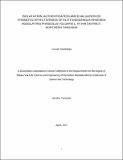| dc.contributor.author | Namkeleja, Yusuph | |
| dc.date.accessioned | 2024-03-21T10:17:45Z | |
| dc.date.available | 2024-03-21T10:17:45Z | |
| dc.date.issued | 2017-04 | |
| dc.identifier.uri | https://doi.org/10.58694/20.500.12479/2496 | |
| dc.description | A Dissertation Submitted in Partial Fulfillment of the Requirements for the Degree of Master’s in Life Sciences and Engineering of the Nelson Mandela African Institution of Science and Technology | en_US |
| dc.description.abstract | Phaseolus vulgaris L. production in Sub Saharan Africa is affected by nitrogen deficiency in the soils. Rhizobium inoculants are considered as the best solution to curb the problem of soil nitrogen deficiency. However, accessibility of rhizobia inoculants in most African countries is a challenge, hence leads to most inoculants being imported from abroad. The estimation of the number of indigenous rhizobia nodulating P.vulgaris in the soils of Hai District, northern Tanzania as well as isolation, authentication and evaluation of the symbiotic effectiveness of those indigenous rhizobia strains was conducted. The most probable number infection method was used to estimate the population of indigenous rhizobia in the soils. Yeast Extract Manitol Agar containing Congo red was used to grow the isolated rhizobia strains. Koch’s postulates were employed in authentication, while the number of nodules per plant, chlorophyll content and other plant growth parameters was used to test effectiveness of the isolated strains. The Shapiro Wilk’s W test was used for testing normality of the data, one way ANOVA and Kruskal-Wallis Rank sum test was used for analysis of the data which are normally distributed and those which are not normally distributed respectively while Fisher’s Least Significant Difference were used as a post hoc significance test. The 61% of the soil in the study area had low rhizobia populations (<100 cells g-1of soil). Moreover, 18 bacterial strains were isolated and proved to be rhizobia. | en_US |
| dc.language.iso | en | en_US |
| dc.publisher | NM-AIST | en_US |
| dc.subject | Research Subject Categories::NATURAL SCIENCES | en_US |
| dc.title | Isolatation, authentication and evaluation of symbiotic effectiveness of elite indigenous rhizobia nodulating phaseolus vulgaris l. in Hai district, Northern Tanzania | en_US |
| dc.type | Thesis | en_US |

